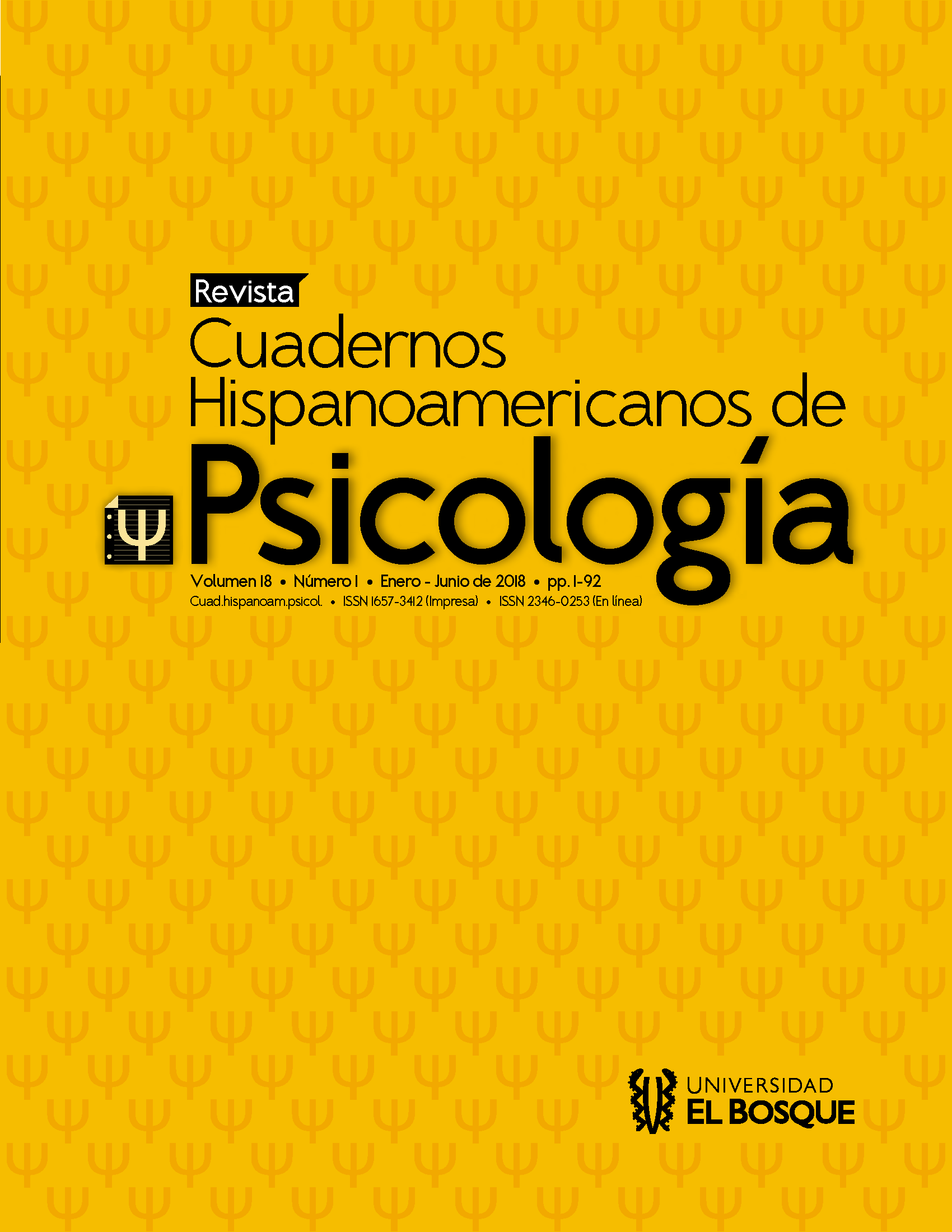Psychological status of students attending a university program for elders: an approach to anxiety and depression symptoms
DOI:
https://doi.org/10.18270/chps..v18i1.2857Keywords:
healthy aging, psychology, anxiety, depressionAbstract
It is a fact that the global population is aging and Europe is the country with the largest proportion of population aged 60 years and over. studies have demonstrated the importance of social networks and social inclusion in the welfare of the elderly. The aim of the current study was to assess psychological status in a group of students participating in a university-based program for retired/elderly people. The hypothesis proposed was that participation in the program would have a positive impact on anxiety and depression symptoms. 45 individuals attending a program for retired/elderly people at the University of the Basque Country in Bilbao, Spain, were assessed with the Brief Symptom Inventory (BSI). The assessment was done prior to the participation in the University-based curriculum, as well as eight months after. Socio-demographic data were also collected. Changes from time 1 to time 2 evaluations in total and factor scores for key dimensions of the BSI were analyzed. For doing so, T tests and multifactorial analyses -particularly focused on anxiety and depression symptoms- were used. A positive change following participation in the program was observed in most dimensions of the BSI, particularly in measures of anxiety and depression symptoms. The provision of special university-based programs for elderly/retired people may lead to positive outcomes in psychological status.
Downloads
References
Blazer, D. G., & Hybels, C. F. (2005). Origins of depression in later life. Psychological Medicine, 35(9), 1241-1252. doi:10.1017/S 0033291705004411
Bryant, C., Jackson, H., & Ames, D. (2008). The prevalence of anxiety in older adults: Methodo-logical issues and a review of the literature. Journal of Affective Disorders, 109(3), 233-250. doi:10.1016/j.jad.2007.11. 008
Buendía, J. (1994). Envejecimiento y psicología de la salud. España: Siglo XXI.
Burroughs, H., Lovell, K., Morley, M., Baldwin, R., Burns, A., & Chew-Graham, C. (2006). ‘Justifiable depression’: How primary care professionals and patients view late-life depres-sion? A qualitative study. Family Practice, 23(3), 369-377. doi: 10.1093/fampra/cmi115
Derogatis, L. R., & Savitz, K. L. (2000). The SCL–90–R and Brief Symptom Inventory (BSI) in primary care. In M. E. Maruish (Ed.), Handbook of psychological assessment in primary care settings (p. 297–334). Lawrence Erlbaum Associates Publishers.
Eum, Y., Yim, J., & Choi, W. (2014). Elderly health and literature therapy: A theoretical review. The Tohoku Journal of Experimental Medicine, 232(2), 79-83. doi:10.1620/tjem. 232.79
Fernández‐Ballesteros Rocio, Mariagovanna Caprara, Schettini Rocio, Antonio Bustillos, Mendo-za‐Núñez Víctor, Teresa Orosa, Rosita Kornfeld (2013). Effects of University Programs for Older Adults: Changes in Cultural and Group Stereotypes, self‐Perception of Aging, and Emo-tional Balance. Educational Gerontology, 39 (2), 119‐19.
Fernández-Ballesteros, R., Caprara, M., Schettini, R., Bustillos, A., Mendoza-Nunez, V., Orosa, T., Kornfeld., R. … Zamarrón. M. D. (2013) Effects of University Programs for Older Adults: Changes in Cultural and Group Stereotype, Self-Perception of Aging, and Emotional Bal-ance, Educational Geronto-logy, 39 (2), 119-131. doi: 10.1080/036012 77. 2012.699817
Jorm, A. F. (2000). Does old age reduce the risk of anxiety and depression? A review of epidemi-ological studies across the adult life span. Psychological Medicine, 30(1), 11-22. doi: 10.1017/s0033291799001452
Laidlaw, K., Thompson, L. W., Gallagher-Thompson, D., & Dick-Siskin, L. (2003). Cognitive behaviour therapy with older people. doi:10.1002/9780470713402
Midanik, L. T., Soghikian, K., Ransom, L. J., & Tekawa, I. S. (1995). The effect of retirement on mental health and health behaviors: The Kaiser Permanente retirement study. The Journals of Gerontology Series B: Psycho-logical Sciences and Social Sciences, 50(1), S59-S61.
Ordoñez, T. N., Tavares, S. S., & Cachioni, M. (2011). Síntomas depresivos en adultos mayores participantes de una universidad abierta de la tercera edad. Revista Española de Geriatría y Gerontología, 46(5), 250–255.
Ortiz, L. P. (2006). Jubilación, género y envejecimiento. Giró, J.: Envejecimiento Activo, Enveje-cimiento En Positivo. Logroño: Universidad De La Rioja. Servicio De Publicaciones, 89-112.
Rodríguez, J. M., Hernandis, S. P., & Chuliá, M. Á T. (2007). Motivaciones y expectativas de los estudiantes mayores de 55 años en los programas universitarios. Revista Española De Geria-tría y Gerontología, 42(3), 158-166.
Sancho, C., Blasco, M., Martínez-Mir, R., & Palmero, F. (2002). Análisis de la motivación para el estudio en adultos mayores. REME–Revista Electrónica De Motivación Y Emoción, Castellón De La Plana, Espanha, 5(10). Recuperado de http://reme.uji.es/articulos/apalmf8342905102/texto.html
Scott, T., Mackenzie, C. S., Chipperfield, J. G., & Sareen, J. (2010). Mental health service use among Canadian older adults with anxiety disorders and clinically significant anxiety symp-toms. Aging & Mental Health, 14(7), 790-800.
Téllez, V., & Jubilación, R. D. (2004). Envejecimiento y espacios alternativos de participación social. Santiago, 104, 102-105.
United Nations. (2002). II international plan of action on ageing. New York, NY: Author.
Wetherell, J. L., Lenze, E. J., & Stanley, M. A. (2005). Evidence-based treatment of geriatric anxiety disorders. The Psychiatric Clinics of North America, 28(4), 871-96, ix. doi: S0193-953X(05)00077-8 [pii]
Wiktorowicz, J. (2017) Extending Working Life: Which Competencies are Crucial in Near-Retirement Age? Journal of Adult Development. Retrieved from https://doi.org/10.1007/s10804-017-9274-9
Downloads
Published
How to Cite
Issue
Section














